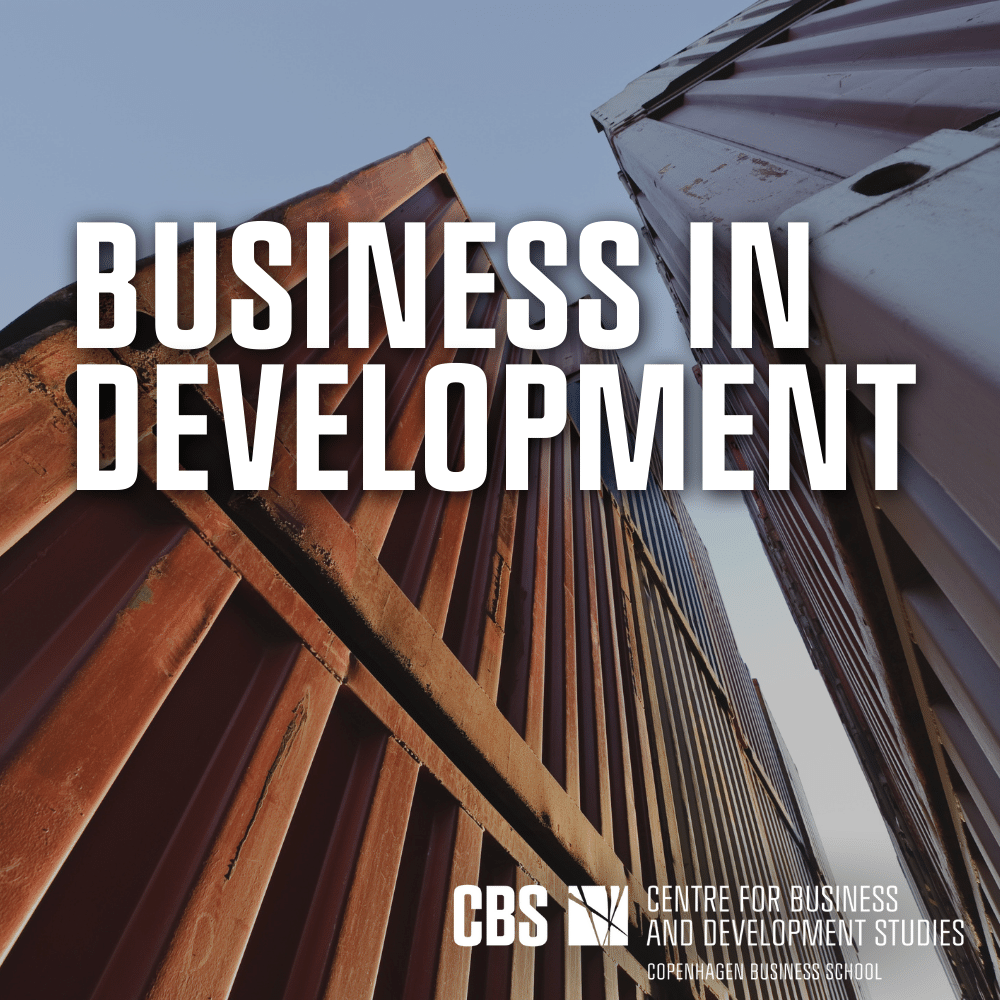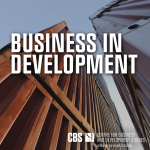The Business in Development Podcast
With this podcast, we wish to bring you the latest insights from our research on the roles of business, government, and civil society in promoting inclusive and sustainable development in the global South.
In each episode, you will meet one of our colleagues and their guests, who will present their take on pressing development issues. We wish to create a platform for a wide variety of actors and to combine conversations with thought leaders, practitioners, world-leading experts, and voices from the field.

Podcast episodes

East Asia’s Ambitious Green Energy Shift Explained
Why has East Asia emerged as the global leader in green energy industries but – until recently – lagged on carbon emission reduction? What is new and distinctive about East Asia’s approach to the green energy transition? In this episode, Lindsay Whitfield and Cornel Ban of Copenhagen Business School discuss these questions with Elizabeth Thurbon, co-author of Developmental Environmentalism. East Asia’s greening strategies are not mere exercises in ‘greenwashing’ or fossil-fuelled ‘business as usual’. Rather, there is something fundamentally transformative underway in the region at the level of elite ideation, strategic ambition, and policy action. State actors in East Asia are engaging in a sophisticated kind of economic statecraft, strategically harnessing the capitalist market dynamics of ‘creative-destruction’ to advance their transformative green ambitions through green growth. The episode participants discuss the lessons that can be learned in Europe from East Asia and the future of the global green shift in an era of geostrategic rivalry.

Industrial Policy for Economic Catch-up in the De-Globalization Era
In this episode, Professor Lindsay Whitfield of Copenhagen Business School is in conversation with Cornel Ban, who is an Associate Professor of International Political Economy at Copenhagen Business School, and Keun Lee who is a Distinguished Professor of Economics, at Seoul National University and was the Otto Mønsted Visiting Professor at Copenhagen Business School. They discuss the industrial policy for economic catch-up in the de-globalization era.

European Chips Act and the Global Race in Semiconductor Industrial Policy
In this episode, Prof. Lindsay Whitfield of Copenhagen Business School is in conversation with Prof. Gale Raj Reichert and Dr. Tobias Wuttke of Bard College Berlin. They discuss the shift in EU industrial policy towards the semiconductor industry.

The contemporary Ghanaian art market: In conversation with artist Dr Dorothy Amenuke
In this episode, Dr Robin Steedman of Copenhagen Business School is in conversation with Dr Dorothy Amenuke of KNUST, Ghana. They discuss Amenuke’s career as an artist and educator as well as the dynamism of the contemporary Ghanaian art market and factors that have led to its major growth in recent years.

The Belt and Road Initiative at ten, geopolitics and China’s role in global development
Professor Lindsay Whitfield from CBDS discusses the tenth anniversary of the Belt and Road Initiative, the contentious politics it engenders, and the role of massive Chinese infrastructural investments globally with Dr. Federico Jensen, external lecturer at Copenhagen Business School. In the episode, they discuss the origins of the Belt and Road Initiative, it’s economic and political successes and failures, and the role of local governments in investment receiving countries.

In Conversation with Keun Lee: A Schumpeterian Approach to Economic Development
As the world embraces industrial policies once relegated to the dustbin of history by mainstream economists and policymakers, we need a more rigorous understanding of how they work across various national policy spheres. In this episode, Prof. Keun Lee from Seoul National University discusses his Schumpeterian approach to economic development with Prof. Lindsay Whitfield, Dr. Cornel Ban and Dr. Tobias Wuttke.

Creating Traceability in Textile Production – With Faryal Sadiq & Prof Peter Lund-Thomsen
In this episode, Prof Peter Lund-Thomsen from CBDS speaks to Faryal Sadiq, Vice-President of Sales and Marketing at Interloop Limited. Interloop is one of the world’s largest hosiery manufacturer and a producer of denim and apparel products, based in Faisalabad, Pakistan employing around 30.000 people. The company has a very active involvement in sustainability and can be considered a giant manufacturer which is part of the broader international trend where giant manufacturers from the global South develop their own broader sustainability agenda – both domestically and internationally.

INFORMAL LABOUR IN THE Sri LankaN APPAREL INDUSTRY – WITH DR. SHYAMAIN WICKRAMASINGHA AND PROF. Lindsay Whitfield
Prof. Lindsay Whitfield from CBDS discusses the situation of informal labor in Sri Lanka’s apparel export factories with Dr. Shyamain Wickramasingha, a Visiting Fellow at CBDS and a Research Fellow at the University of Sussex Business School. Critiquing the mainstream view that working informally in apparel factories is women’s choice, Dr. Wickramasingha explains why this view is too simplistic. She takes us through the origins of informal labor market, how it works and the implications for informal female workers and looks forward into how the dual formal and informal labor regimes could be changed.

THE AFRICAN CONTINENT FREE TRADE AREA – WITH PROFESSOR FAIZEL ISMAIL AND PROFESSOR Lindsay Whitfield
In this episode, Professor Lindsay Whitfield from CBDS discusses with Professor Faizel Ismail from the University of Cape Town the opportunities and challenges with using the African Continental Free Trade Area to spur regional industrialization and regional value chains.
